Runhua Xu
FRoD: Full-Rank Efficient Fine-Tuning with Rotational Degrees for Fast Convergence
Dec 29, 2025Abstract:Parameter-efficient fine-tuning (PEFT) methods have emerged as a practical solution for adapting large foundation models to downstream tasks, reducing computational and memory costs by updating only a small subset of parameters. Among them, approaches like LoRA aim to strike a balance between efficiency and expressiveness, but often suffer from slow convergence and limited adaptation capacity due to their inherent low-rank constraints. This trade-off hampers the ability of PEFT methods to capture complex patterns needed for diverse tasks. To address these challenges, we propose FRoD, a novel fine-tuning method that combines hierarchical joint decomposition with rotational degrees of freedom. By extracting a globally shared basis across layers and injecting sparse, learnable perturbations into scaling factors for flexible full-rank updates, FRoD enhances expressiveness and efficiency, leading to faster and more robust convergence. On 20 benchmarks spanning vision, reasoning, and language understanding, FRoD matches full model fine-tuning in accuracy, while using only 1.72% of trainable parameters under identical training budgets.
Sparsification Under Siege: Defending Against Poisoning Attacks in Communication-Efficient Federated Learning
Apr 30, 2025



Abstract:Federated Learning (FL) enables collaborative model training across distributed clients while preserving data privacy, yet it faces significant challenges in communication efficiency and vulnerability to poisoning attacks. While sparsification techniques mitigate communication overhead by transmitting only critical model parameters, they inadvertently amplify security risks: adversarial clients can exploit sparse updates to evade detection and degrade model performance. Existing defense mechanisms, designed for standard FL communication scenarios, are ineffective in addressing these vulnerabilities within sparsified FL. To bridge this gap, we propose FLARE, a novel federated learning framework that integrates sparse index mask inspection and model update sign similarity analysis to detect and mitigate poisoning attacks in sparsified FL. Extensive experiments across multiple datasets and adversarial scenarios demonstrate that FLARE significantly outperforms existing defense strategies, effectively securing sparsified FL against poisoning attacks while maintaining communication efficiency.
Privacy-Preserving Federated Embedding Learning for Localized Retrieval-Augmented Generation
Apr 27, 2025Abstract:Retrieval-Augmented Generation (RAG) has recently emerged as a promising solution for enhancing the accuracy and credibility of Large Language Models (LLMs), particularly in Question & Answer tasks. This is achieved by incorporating proprietary and private data from integrated databases. However, private RAG systems face significant challenges due to the scarcity of private domain data and critical data privacy issues. These obstacles impede the deployment of private RAG systems, as developing privacy-preserving RAG systems requires a delicate balance between data security and data availability. To address these challenges, we regard federated learning (FL) as a highly promising technology for privacy-preserving RAG services. We propose a novel framework called Federated Retrieval-Augmented Generation (FedE4RAG). This framework facilitates collaborative training of client-side RAG retrieval models. The parameters of these models are aggregated and distributed on a central-server, ensuring data privacy without direct sharing of raw data. In FedE4RAG, knowledge distillation is employed for communication between the server and client models. This technique improves the generalization of local RAG retrievers during the federated learning process. Additionally, we apply homomorphic encryption within federated learning to safeguard model parameters and mitigate concerns related to data leakage. Extensive experiments conducted on the real-world dataset have validated the effectiveness of FedE4RAG. The results demonstrate that our proposed framework can markedly enhance the performance of private RAG systems while maintaining robust data privacy protection.
Dual Defense: Enhancing Privacy and Mitigating Poisoning Attacks in Federated Learning
Feb 08, 2025Abstract:Federated learning (FL) is inherently susceptible to privacy breaches and poisoning attacks. To tackle these challenges, researchers have separately devised secure aggregation mechanisms to protect data privacy and robust aggregation methods that withstand poisoning attacks. However, simultaneously addressing both concerns is challenging; secure aggregation facilitates poisoning attacks as most anomaly detection techniques require access to unencrypted local model updates, which are obscured by secure aggregation. Few recent efforts to simultaneously tackle both challenges offen depend on impractical assumption of non-colluding two-server setups that disrupt FL's topology, or three-party computation which introduces scalability issues, complicating deployment and application. To overcome this dilemma, this paper introduce a Dual Defense Federated learning (DDFed) framework. DDFed simultaneously boosts privacy protection and mitigates poisoning attacks, without introducing new participant roles or disrupting the existing FL topology. DDFed initially leverages cutting-edge fully homomorphic encryption (FHE) to securely aggregate model updates, without the impractical requirement for non-colluding two-server setups and ensures strong privacy protection. Additionally, we proposes a unique two-phase anomaly detection mechanism for encrypted model updates, featuring secure similarity computation and feedback-driven collaborative selection, with additional measures to prevent potential privacy breaches from Byzantine clients incorporated into the detection process. We conducted extensive experiments on various model poisoning attacks and FL scenarios, including both cross-device and cross-silo FL. Experiments on publicly available datasets demonstrate that DDFed successfully protects model privacy and effectively defends against model poisoning threats.
TAPFed: Threshold Secure Aggregation for Privacy-Preserving Federated Learning
Jan 09, 2025



Abstract:Federated learning is a computing paradigm that enhances privacy by enabling multiple parties to collaboratively train a machine learning model without revealing personal data. However, current research indicates that traditional federated learning platforms are unable to ensure privacy due to privacy leaks caused by the interchange of gradients. To achieve privacy-preserving federated learning, integrating secure aggregation mechanisms is essential. Unfortunately, existing solutions are vulnerable to recently demonstrated inference attacks such as the disaggregation attack. This paper proposes TAPFed, an approach for achieving privacy-preserving federated learning in the context of multiple decentralized aggregators with malicious actors. TAPFed uses a proposed threshold functional encryption scheme and allows for a certain number of malicious aggregators while maintaining security and privacy. We provide formal security and privacy analyses of TAPFed and compare it to various baselines through experimental evaluation. Our results show that TAPFed offers equivalent performance in terms of model quality compared to state-of-the-art approaches while reducing transmission overhead by 29%-45% across different model training scenarios. Most importantly, TAPFed can defend against recently demonstrated inference attacks caused by curious aggregators, which the majority of existing approaches are susceptible to.
* The paper has been published in IEEE TDSC
Privacy-Preserving Machine Learning: Methods, Challenges and Directions
Aug 10, 2021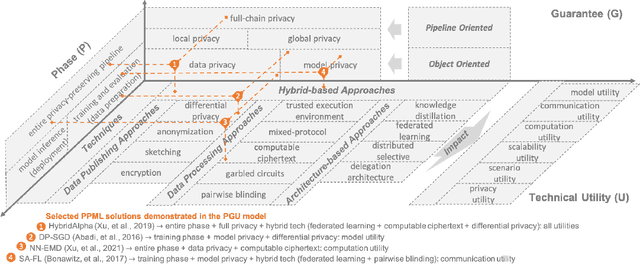

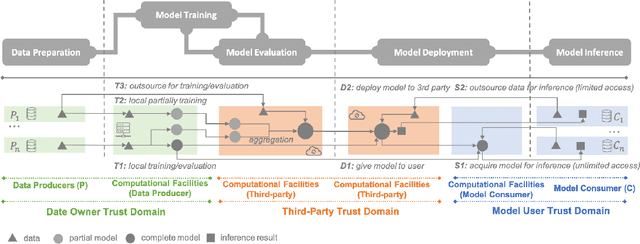
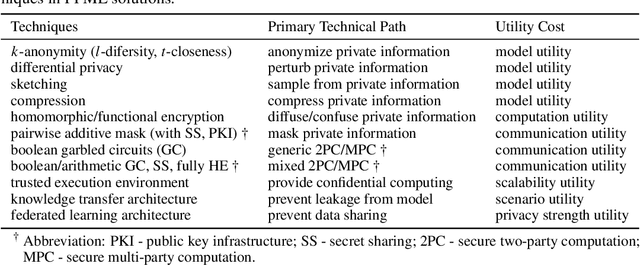
Abstract:Machine learning (ML) is increasingly being adopted in a wide variety of application domains. Usually, a well-performing ML model, especially, emerging deep neural network model, relies on a large volume of training data and high-powered computational resources. The need for a vast volume of available data raises serious privacy concerns because of the risk of leakage of highly privacy-sensitive information and the evolving regulatory environments that increasingly restrict access to and use of privacy-sensitive data. Furthermore, a trained ML model may also be vulnerable to adversarial attacks such as membership/property inference attacks and model inversion attacks. Hence, well-designed privacy-preserving ML (PPML) solutions are crucial and have attracted increasing research interest from academia and industry. More and more efforts of PPML are proposed via integrating privacy-preserving techniques into ML algorithms, fusing privacy-preserving approaches into ML pipeline, or designing various privacy-preserving architectures for existing ML systems. In particular, existing PPML arts cross-cut ML, system, security, and privacy; hence, there is a critical need to understand state-of-art studies, related challenges, and a roadmap for future research. This paper systematically reviews and summarizes existing privacy-preserving approaches and proposes a PGU model to guide evaluation for various PPML solutions through elaborately decomposing their privacy-preserving functionalities. The PGU model is designed as the triad of Phase, Guarantee, and technical Utility. Furthermore, we also discuss the unique characteristics and challenges of PPML and outline possible directions of future work that benefit a wide range of research communities among ML, distributed systems, security, and privacy areas.
FedV: Privacy-Preserving Federated Learning over Vertically Partitioned Data
Mar 05, 2021
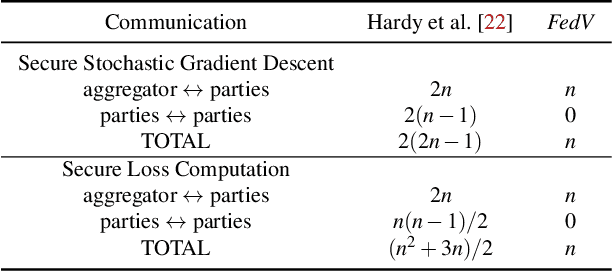

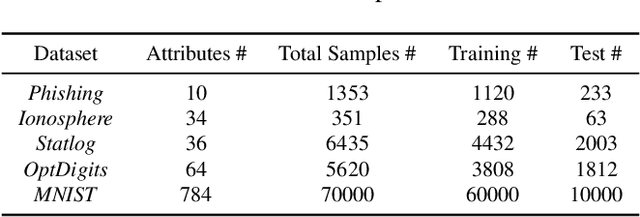
Abstract:Federated learning (FL) has been proposed to allow collaborative training of machine learning (ML) models among multiple parties where each party can keep its data private. In this paradigm, only model updates, such as model weights or gradients, are shared. Many existing approaches have focused on horizontal FL, where each party has the entire feature set and labels in the training data set. However, many real scenarios follow a vertically-partitioned FL setup, where a complete feature set is formed only when all the datasets from the parties are combined, and the labels are only available to a single party. Privacy-preserving vertical FL is challenging because complete sets of labels and features are not owned by one entity. Existing approaches for vertical FL require multiple peer-to-peer communications among parties, leading to lengthy training times, and are restricted to (approximated) linear models and just two parties. To close this gap, we propose FedV, a framework for secure gradient computation in vertical settings for several widely used ML models such as linear models, logistic regression, and support vector machines. FedV removes the need for peer-to-peer communication among parties by using functional encryption schemes; this allows FedV to achieve faster training times. It also works for larger and changing sets of parties. We empirically demonstrate the applicability for multiple types of ML models and show a reduction of 10%-70% of training time and 80% to 90% in data transfer with respect to the state-of-the-art approaches.
NN-EMD: Efficiently Training Neural Networks using Encrypted Multi-sourced Datasets
Dec 18, 2020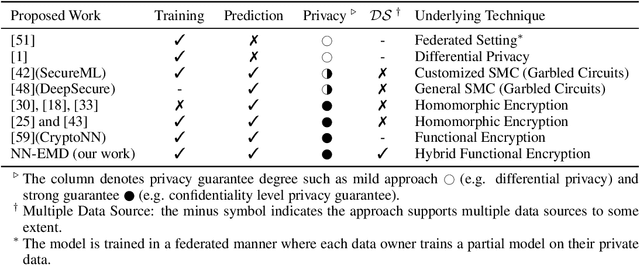

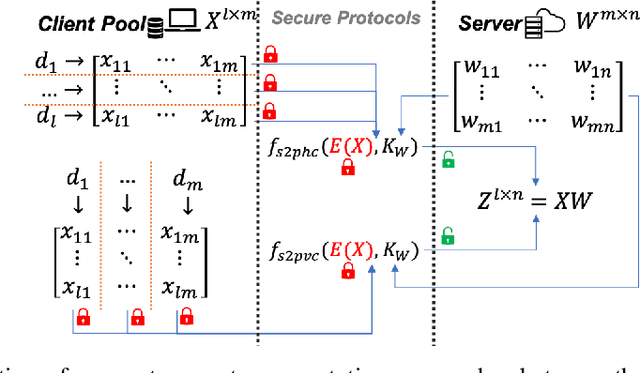
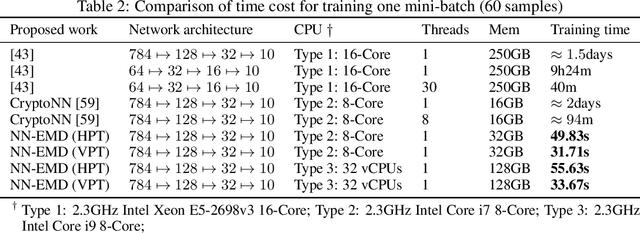
Abstract:Training a machine learning model over an encrypted dataset is an existing promising approach to address the privacy-preserving machine learning task, however, it is extremely challenging to efficiently train a deep neural network (DNN) model over encrypted data for two reasons: first, it requires large-scale computation over huge datasets; second, the existing solutions for computation over encrypted data, such as homomorphic encryption, is inefficient. Further, for an enhanced performance of a DNN model, we also need to use huge training datasets composed of data from multiple data sources that may not have pre-established trust relationships among each other. We propose a novel framework, NN-EMD, to train DNN over multiple encrypted datasets collected from multiple sources. Toward this, we propose a set of secure computation protocols using hybrid functional encryption schemes. We evaluate our framework for performance with regards to the training time and model accuracy on the MNIST datasets. Compared to other existing frameworks, our proposed NN-EMD framework can significantly reduce the training time, while providing comparable model accuracy and privacy guarantees as well as supporting multiple data sources. Furthermore, the depth and complexity of neural networks do not affect the training time despite introducing a privacy-preserving NN-EMD setting.
HybridAlpha: An Efficient Approach for Privacy-Preserving Federated Learning
Dec 12, 2019



Abstract:Federated learning has emerged as a promising approach for collaborative and privacy-preserving learning. Participants in a federated learning process cooperatively train a model by exchanging model parameters instead of the actual training data, which they might want to keep private. However, parameter interaction and the resulting model still might disclose information about the training data used. To address these privacy concerns, several approaches have been proposed based on differential privacy and secure multiparty computation (SMC), among others. They often result in large communication overhead and slow training time. In this paper, we propose HybridAlpha, an approach for privacy-preserving federated learning employing an SMC protocol based on functional encryption. This protocol is simple, efficient and resilient to participants dropping out. We evaluate our approach regarding the training time and data volume exchanged using a federated learning process to train a CNN on the MNIST data set. Evaluation against existing crypto-based SMC solutions shows that HybridAlpha can reduce the training time by 68% and data transfer volume by 92% on average while providing the same model performance and privacy guarantees as the existing solutions.
CryptoNN: Training Neural Networks over Encrypted Data
Apr 26, 2019



Abstract:Emerging neural networks based machine learning techniques such as deep learning and its variants have shown tremendous potential in many application domains. However, they raise serious privacy concerns due to the risk of leakage of highly privacy-sensitive data when data collected from users is used to train neural network models to support predictive tasks. To tackle such serious privacy concerns, several privacy-preserving approaches have been proposed in the literature that use either secure multi-party computation (SMC) or homomorphic encryption (HE) as the underlying mechanisms. However, neither of these cryptographic approaches provides an efficient solution towards constructing a privacy-preserving machine learning model, as well as supporting both the training and inference phases. To tackle the above issue, we propose a CryptoNN framework that supports training a neural network model over encrypted data by using the emerging functional encryption scheme instead of SMC or HE. We also construct a functional encryption scheme for basic arithmetic computation to support the requirement of the proposed CryptoNN framework. We present performance evaluation and security analysis of the underlying crypto scheme and show through our experiments that CryptoNN achieves accuracy that is similar to those of the baseline neural network models on the MNIST dataset.
 Add to Chrome
Add to Chrome Add to Firefox
Add to Firefox Add to Edge
Add to Edge